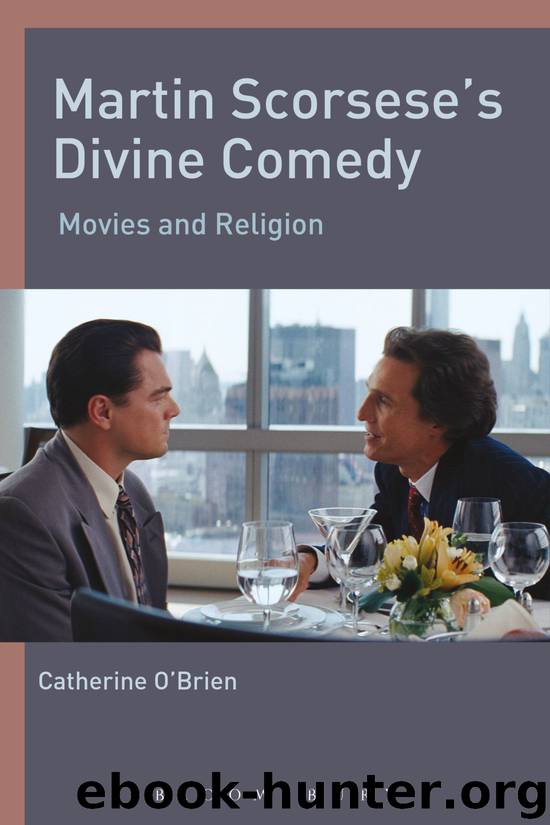Martin Scorsese's Divine Comedy by Catherine O'Brien

Author:Catherine O'Brien
Language: eng
Format: epub
Publisher: Bloomsbury UK
Wasted talent
Deficient love also leads to more conventional ideas of sloth with regard to the use of one’s talents. Bliss claims that Alice Doesn’t Live Here Anymore ‘communicates a semblance of moral progress while what it actually catalogues is a story of spiritual inertia’ (Bliss 1995: 45). At one point the heroine is literally at a crossroads and says, ‘Quo vadis?’ echoing the famous story of St Peter. Scorsese admits that he ‘was fascinated by Ancient Rome because of the church’ (Schickel 2013) and that he liked the film Quo Vadis (1951) by Mervyn LeRoy. Alice appears to give up on her singing career, not making the most of her (admittedly unspectacular) gifts, but Scorsese was unhappy with the compromise scene in the diner in which Alice reconciles with her lover David. Ellen Burstyn explains: ‘The end they wanted was a movie ending, not a real ending – which was why Marty had everybody in the restaurant applaud, because that was his way of acknowledging that this was the movie ending’ (in Kelly 1996: 84–5).
In Scorsese’s adaptation of Edith Wharton’s novel The Age of Innocence, Newland Archer (Daniel Day-Lewis) has a comfortable nineteenth-century lifestyle but an insufficient sense of purpose. ‘The theme of conformity’ is seen ‘during a street scene in which an all-male band of pedestrians marches against the wind wearing identical derbies’ (Blake 2005). Newland Archer does eventually commit to his marriage with May Welland (Winona Ryder) but, as Roger Ebert points out, there is poignancy in the final scene that ‘reveals that the man was not the only one with feeling – that others sacrificed for him, that his deepest tragedy was not what he lost, but what he never realized he had’ (2008: 133). At the other end of the social scale, Johnny Boy’s poor work ethic in twentieth-century New York leads to the dramatic finale in Mean Streets in which he is shot because he cannot pay his debts, although he does remain alive.
There are also signs of recovery when ‘Fast Eddie’ picks up his pool cue again in The Color of Money; Lionel Dobie returns to his canvas in Life Lessons; and Howard Hughes leaves the darkness of his screening room and takes the controls of The Hercules in The Aviator. But sloth is a difficult aspect to address on film, given that visualizing indolence is not necessarily an entertaining prospect. As the Pilgrim has already been informed in Inferno:
‘Now it behoves thee thus to put off sloth,’
My Master said; ‘for sitting upon down,
Or under quilt, one cometh not to fame,
Withouten which whoso his life consumes
Such vestige leaveth of himself on earth,
As smoke in air or in the water foam.’ (Inf. XXIV)
The piteous sight of Jake La Motta’s expanding girth in Raging Bull is a visible symbol of his inner weakness, while the stage routines in the night club might earn sympathy, as they ‘involve a kind of self-humiliation that is painful to watch’ (Bliss 1995: 70). ‘The man without a soul has nowhere to go but outward,’ claims Peter Ackroyd (in Hayes 2005: 6).
Download
This site does not store any files on its server. We only index and link to content provided by other sites. Please contact the content providers to delete copyright contents if any and email us, we'll remove relevant links or contents immediately.
Call Me by Your Name by André Aciman(20517)
Ready Player One by Cline Ernest(14677)
How to Be a Bawse: A Guide to Conquering Life by Lilly Singh(7486)
Wiseguy by Nicholas Pileggi(5787)
The Kite Runner by Khaled Hosseini(5180)
On Writing A Memoir of the Craft by Stephen King(4944)
Audition by Ryu Murakami(4932)
The Crown by Robert Lacey(4817)
Call me by your name by Andre Aciman(4688)
Gerald's Game by Stephen King(4654)
Harry Potter and the Cursed Child: The Journey by Harry Potter Theatrical Productions(4507)
Dialogue by Robert McKee(4405)
The Perils of Being Moderately Famous by Soha Ali Khan(4220)
Dynamic Alignment Through Imagery by Eric Franklin(4217)
Apollo 8 by Jeffrey Kluger(3709)
The Inner Game of Tennis by W. Timothy Gallwey(3687)
Seriously... I'm Kidding by Ellen DeGeneres(3634)
How to be Champion: My Autobiography by Sarah Millican(3593)
Darker by E L James(3520)
